
FACULTY OF ARTS AND SCIENCES
Department of Sociology
HUM 102 | Course Introduction and Application Information
| Course Name |
History of Civilization II
|
|
Code
|
Semester
|
Theory
(hour/week) |
Application/Lab
(hour/week) |
Local Credits
|
ECTS
|
|
HUM 102
|
Fall/Spring
|
3
|
0
|
3
|
6
|
| Prerequisites |
None
|
|||||
| Course Language |
English
|
|||||
| Course Type |
Service Course
|
|||||
| Course Level |
First Cycle
|
|||||
| Mode of Delivery | - | |||||
| Teaching Methods and Techniques of the Course | - | |||||
| Course Coordinator | - | |||||
| Course Lecturer(s) | ||||||
| Assistant(s) | - | |||||
| Course Objectives | The basic purpose of this course is to acquaint students with the basic evolutionary developments in the History of Western Civiliziaitons and to enable them to analyze these developments, through a comparative perspective, in the economic, sociopolitical, cultural and scientific field for understanding the dynamics of the modern world. |
| Learning Outcomes |
The students who succeeded in this course;
|
| Course Description | The content of the course Hum 101 starts with the Prehistoric Ages and deals with the first civilizations, Ancient greek and Roman cultural and political developments, the Byzantine Empire and the basic important developments in Europe during the Medieval Age. |
|
|
Core Courses | |
| Major Area Courses | ||
| Supportive Courses |
X
|
|
| Media and Management Skills Courses | ||
| Transferable Skill Courses |
WEEKLY SUBJECTS AND RELATED PREPARATION STUDIES
| Week | Subjects | Related Preparation |
| 1 | Introduction: The Rise of Western Civilizaiton Renaissance & Reform | Robert E. Lerner, et al., Western Civilizaitons, Their History and Their Culture, London, 1998. |
| 2 | The years of inventions in Europe The economic and social reflections of the inventions in Europe | Robert E. Lerner, et al., Western Civilizaitons, Their History and Their Culture, London, 1998. |
| 3 | Martin Luther: The spread of Protestanism John Calvin: Calvinism | Robert E. Lerner, et al., Western Civilizaitons, Their History and Their Culture, London, 1998. |
| 4 | Catholic Reform: Its causes and consequences | Robert E. Lerner, et al., Western Civilizaitons, Their History and Their Culture, London, 1998. |
| 5 | Europe at the Early Modern Age: Economy and society Capitalism, mercantilism and commercial developments | Robert E. Lerner, et al., Western Civilizaitons, Their History and Their Culture, London, 1998. |
| 6 | 1st midterm exam | Robert E. Lerner, et al., Western Civilizaitons, Their History and Their Culture, London, 1998. |
| 7 | Colonization and Oversea trade Agriculture and Industry | Robert E. Lerner, et al., Western Civilizaitons, Their History and Their Culture, London, 1998. |
| 8 | From Empire to national state in Europe France and England | Robert E. Lerner, et al., Western Civilizaitons, Their History and Their Culture, London, 1998. |
| 9 | Revolutions in Western Civilization Scientific Revolution and Enlightenment Art and Literature | Robert E. Lerner, et al., Western Civilizaitons, Their History and Their Culture, London, 1998. |
| 10 | French Revolution The rise of the principle of nationalism and its development | Robert E. Lerner, et al., Western Civilizaitons, Their History and Their Culture, London, 1998. |
| 11 | Industrial Revolution Urbanization and the Class consciousness, Imperialism and its consequences | Robert E. Lerner, et al., Western Civilizaitons, Their History and Their Culture, London, 1998. |
| 12 | 2nd midterm exam | Robert E. Lerner, et al., Western Civilizaitons, Their History and Their Culture, London, 1998. |
| 13 | Europe as the modern civilization Social and economic life Plitical life | Robert E. Lerner, et al., Western Civilizaitons, Their History and Their Culture, London, 1998. |
| 14 | General evaluation | |
| 15 | Review of the Semester | |
| 16 | Review of the Semester |
| Course Notes/Textbooks | the related chapters of the books mentioned |
| Suggested Readings/Materials | M. Kishlansky, P. Geary, P. O’Brien. Civilization in the West, 6th ed. New York: Pearson Inc., 2006. Server Tanilli, Uygarlık Tarihi, İstanbul, 2006. |
EVALUATION SYSTEM
| Semester Activities | Number | Weigthing |
| Participation | ||
| Laboratory / Application | ||
| Field Work | ||
| Quizzes / Studio Critiques | ||
| Portfolio | ||
| Homework / Assignments | ||
| Presentation / Jury | ||
| Project | ||
| Seminar / Workshop | ||
| Oral Exams | ||
| Midterm |
2
|
50
|
| Final Exam |
1
|
50
|
| Total |
| Weighting of Semester Activities on the Final Grade |
50
|
|
| Weighting of End-of-Semester Activities on the Final Grade |
50
|
|
| Total |
ECTS / WORKLOAD TABLE
| Semester Activities | Number | Duration (Hours) | Workload |
|---|---|---|---|
| Theoretical Course Hours (Including exam week: 16 x total hours) |
16
|
3
|
48
|
| Laboratory / Application Hours (Including exam week: '.16.' x total hours) |
16
|
0
|
|
| Study Hours Out of Class |
14
|
4
|
56
|
| Field Work |
0
|
||
| Quizzes / Studio Critiques |
0
|
||
| Portfolio |
0
|
||
| Homework / Assignments |
0
|
||
| Presentation / Jury |
0
|
||
| Project |
0
|
||
| Seminar / Workshop |
0
|
||
| Oral Exam |
0
|
||
| Midterms |
2
|
20
|
40
|
| Final Exam |
1
|
27
|
27
|
| Total |
171
|
COURSE LEARNING OUTCOMES AND PROGRAM QUALIFICATIONS RELATIONSHIP
|
#
|
Program Competencies/Outcomes |
* Contribution Level
|
||||
|
1
|
2
|
3
|
4
|
5
|
||
| 1 | To have the knowledge of classical and contemporary theories in sociology, and be able to comparatively analyze these theories. |
X | ||||
| 2 | To have the knowledge of main methodological approaches in sociology as well as social research and data analysis methods. |
X | ||||
| 3 | To have knowledge in the fields of general sociology, sociology of institutions, social structure and change, and applied sociology. |
X | ||||
| 4 | To be able to determine the appropriate methods in the design of the planning stage and conclusion of a sociological project, individually or as part of a team. |
X | ||||
| 5 | To be able to diagnose the social dynamics behind personal problems by using sociological imagination. |
X | ||||
| 6 | To be able to define social problems at local, national, and global level, and offer new policies for solutions. |
X | ||||
| 7 | To be able to apply commonly-used computer programs for data collection and analysis in sociological research. |
X | ||||
| 8 | To be able to develop a socially responsible, scientific and ethical perspective regarding the collection, analysis, interpretation and presentation of data. |
X | ||||
| 9 | To be able to analyze different aspects of the social world by drawing on the knowledge produced by other disciplines of the social sciences. |
X | ||||
| 10 | To be able to constantly renew herself/himself professionally by following scientific and technological developments in sociology and social research. |
|||||
| 11 | To be able to collect sociological data and communicate with sociologists and other social scientists in a foreign language ("European Language Portfolio Global Scale", Level B1). |
X | ||||
| 12 | To be able to speak a second foreign at a medium level of fluency efficiently. |
X | ||||
| 13 | To be able to relate the knowledge accumulated throughout the human history to their field of expertise. |
|||||
*1 Lowest, 2 Low, 3 Average, 4 High, 5 Highest
NEWS |ALL NEWS
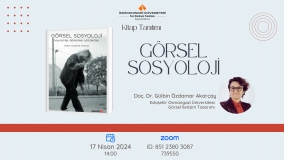
Book Presentation and Talk: Visual Sociology
Department of Sociology invites you to the Book Presentation and Talk event with Gülbin Özdamar Akarçay, the author of “Visual Sociology". Date:
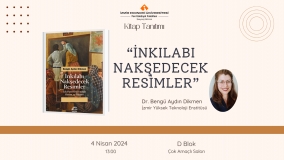
Book Presentation and Talk: Painting the Revolution
Department of Sociology invites you to the Book Presentation and Talk event with Dr. Bengü Aydın Dikmen, the author of “Painting the
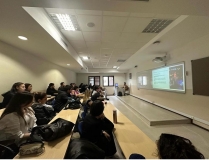
We welcomed ethnomusicologist Onur Sönmez.
We held our sociology seminar where we hosted ethnomusicologist Onur Sönmez. We thank him very much for this detailed and interesting presentation.
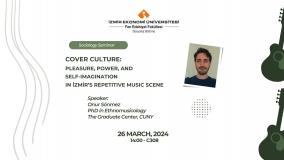
Cover Culture: Pleasure, Power, and Self-Imagination in İzmir’s Repetitive Music Scene
You are cordially invited to the Sociology Seminar where we will host Dr. Onur Sönmez. Onur Sönmez has a PhD in ethnomusicology
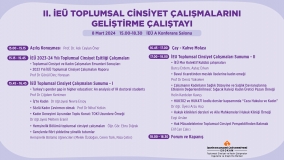
II. IUE GENDER STUDIES DEVELOPMENT WORKSHOP (EKOKAM- Gender and Women’s Studies Research and Application Center)
Research Assistant Helin Kardelen Kavuş attended the “II. IUE Gender Studies Development Workshop” on March 8, 2024, International Women's Day. Organized by EKOKAM, the workshop
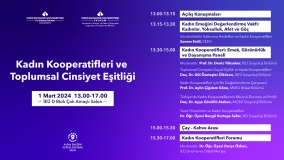
Women’s Cooperatives and Gender Equality
You are cordially invited to "Women's Cooperatives and Gender Equality", which will be co-organized by IUE EKOKAM, the Department of Sociology, and
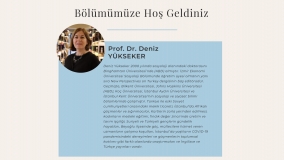
Welcoming Our New Faculty Member: Professor Deniz Yükseker
We are proud to welcome and introduce our newest faculty member: Professor Deniz Yükseker. We wish her all the best and success
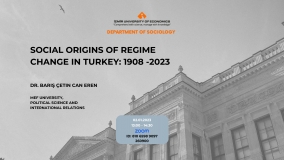
Sociology Seminar: Social Origins of Regime Change in Turkey: 1908 -2023
Department of Sociology cordially invites you to a seminar on "Social Origins of Regime Change in Turkey: 1908 - 2023" by Dr.



